Sen. Susan Collins of Maine ended days of speculation early Saturday morning by voting in favor of a sweeping Republican tax reform package in the Senate, reaching her decision after receiving support for several amendments she proposed to the bill. Collins’ vote was critical as the measure passed, 51-49.
“Having secured these key improvements in the bill, as well as the commitments to legislation to help lower health insurance premiums, I will cast my vote in support of the Senate tax reform bill,” Collins said Friday in a statement. “As revised, this bill will provide much-needed tax relief and simplification for lower- and middle-income families, while spurring the creation of good jobs and greater economic growth.”
Senate Majority Leader Mitch McConnell of Kentucky announced Friday morning that there were enough votes to pass the tax reform bill after Collins and the other holdouts – Sens. Jeff Flake of Arizona, Ron Johnson of Wisconsin and Bob Corker of Tennessee – agreed to support it.
Debate on the bill continued late into early Saturday morning, prolonged by votes on numerous amendments and a motion to adjourn until Monday that failed on party-line vote.
Under the bill, most of the tax benefits will go to wealthy Americans, according to official nonpartisan analyses by the Joint Committee on Taxation and the Congressional Budget Office. Also, tax cuts for individuals will expire in 10 years, while tax cuts for corporations will remain permanent.
People who earn under $30,000 will see their taxes increase in 2019, according to the Congressional Budget Office. Half of all taxpayers would experience tax increases by 2027, according to the Tax Policy Center, a Washington think tank. A congressional scorekeeper projects the bill would add $1 trillion to the deficit over the next decade.
“I don’t think there is a single American who thinks that our current tax code is fair, simple, or promotes economic growth,” Collins said in her statement.
DENOUNCED BY DEMOCRATS
Democrats in Maine and elsewhere swiftly denounced Collins’ vote.
Andy Slavitt, former acting administrator of the U.S. Centers for Medicare and Medicaid Services under the Obama administration, told the Press Herald in a phone interview Friday that Collins will hear from many Mainers who will be unhappy with her vote.
“I think she is making a calculated big mistake,” Slavitt said. “I suspect she’s going to regret this vote.”
Leading up to the vote, anti-tax reform activists held rallies in front of Collins’ offices in Portland and Bangor.
“Senator Collins has let down the people of Maine. As a result of her disappointing decision … middle-class people in Maine are likely to face higher health care costs and higher taxes – all so that the wealthiest can line their pockets with even more money,” Maine Democratic Party Chairman Phil Bartlett said in a statement.
Collins insisted that amendments she proposed significantly improved the bill.
The Maine senator issued a series of tweets Friday highlighting the formal or informal Senate agreements to attach to the bill several amendments she proposed from the floor Thursday. The amendments moved the bill somewhat closer to the political center, although the overall thrust of the bill was still skewed toward generous tax cuts for the wealthy while exploding the national debt. The House passed a similar version of tax reform in November, but there are significant differences that will have to be reconciled in a conference committee, approved again by the House and Senate and signed by President Trump before becoming law.
Pro-business groups have touted tax reform, arguing that cutting corporate tax rates from 35 to 20 percent would spur economic growth.
Collins tweeted that she was “delighted” that the Senate had agreed to preserve some state and local tax deductions in the bill, which were eliminated in the initial Senate version of the bill.
She also tweeted that “the Senate bill will include my amendment to reduce the threshold for deducting medical expenses, which helps people with high medical costs, particularly seniors and people with chronic conditions.”
In a third tweet, Collins said the bill also would include her amendment to reverse the elimination of catch-up retirement account contributions by church, charitable and certain public employees.
The threshold to claim medical expense deductions would decline from 10 to 7.5 percent under Collins’ amendment.
But health policy experts say that if the bill were to become law it would have devastating consequences, and that amendments by Collins would do little to help.
Estimates project that the bill’s repeal of the Affordable Care Act’s individual mandate would leave 13 million more without insurance, including 50,000 in Maine, and increase premiums by 10 percent. The bill also would trigger $25 billion in automatic cuts to Medicare, according to the Congressional Budget Office.
TO ‘MITIGATE’ MANDATE REPEAL
Collins has vowed that the Medicare cuts will be addressed in future votes and would not take place, and McConnell and House Speaker Paul Ryan issued a joint statement Friday promising the cuts would not occur.
I received assurances today that no reduction in Medicare will be triggered by tax bill. See exchange of letters. pic.twitter.com/Z3mbHjr0NE
— Sen. Susan Collins (@SenatorCollins) December 1, 2017
Slavitt said repealing the ACA’s individual mandate will lead to severe instability in the ACA’s marketplace.
“This will hobble the ACA,” Slavitt said. He said even if Congress, at Collins’ urging, agrees to approve two ACA stabilization bills – Collins-Nelson and Alexander-Murray – it would do little to stem the damage caused by repeal.
Slavitt said the ACA stabilization bills are underfunded and inadequate.
Collins disagreed, saying both would “mitigate” the harm caused by mandate repeal, and the Collins-Nelson reinsurance bill would help insurance companies that stand to lose money by repealing the mandate. The mandate, where people who don’t have employer-based health coverage must buy insurance or pay a penalty, keeps young and healthy people in the insurance pool, helping to keep premium costs down.
“Bipartisan legislation I introduced would protect people with pre-existing conditions while lowering premiums through the use of high-risk pools. This plan will provide $5 billion annually for two years in seed money for states to establish invisible high-risk pools or traditional reinsurance programs. We know from experiences in the states of Maine and Alaska that high-risk pools can help to lower premiums substantially – by an average of 20 percent,” Collins said in the statement.
Slavitt said there’s no guarantee the votes on the ACA stabilization bill will even happen.
McConnell, in remarks on the Senate floor Friday, did not commit to voting on the ACA stabilization bills prior to the final vote on tax reform – after a Senate-House conference committee – saying only that such a vote would “ideally” take place before final passage.
In July, Collins was one of three Republican senators to buck the party and oppose ACA repeal, and the health insurance law was preserved by one vote. She was welcomed home to cheers at the Bangor airport.
“I don’t think she’s going to be hearing any applause at the airport for supporting this tax package,” said Steve Butterfield, public policy director of Maine-based Consumers for Affordable Health Care.
The Joint Committee on Taxation reported Thursday that the bill would add $1 trillion to the deficit over 10 years, even after adjusting for economic growth, prompting Flake and Corker’s objections to the bill. Collins also has expressed reservations in the past about adding to the national debt.
In a 2013 “Eggs and Issues” speech to the Portland Regional Chamber of Commerce, she gave a presentation warning of the dangers of expanding the national debt, saying that it threatens programs like Social Security, Medicare and Medicaid.
“Excessive government borrowing crowds out the private sector, stifles business investment, depresses wages and slows economic growth,” Collins said at the time.
But concerns about the debt were overriden by Republican senators who wanted to approve the tax reform package.
SLIGHT REPUBLICAN EDGE
In a closely divided Senate, Republicans had little margin for error, with all 48 Democrats and left-leaning independents, including Maine Sen. Angus King, voting “no.”
King, in an appearance on MSNBC’s “Morning Joe” on Friday, said the bill will have a “huge impact,” and no one knows what’s in it because most of the proceedings were done behind closed doors.
“We don’t even know what this bill is,” King said. “It’s absolutely ridiculous.”
Lori Parham, state director of AARP Maine, said Collins should vote “no” based on threats to Medicare.
“We don’t think it’s fair that older Mainers who have paid into Medicare their entire working lives get stuck covering the costs of a tax overhaul,” Parham said.
The bill would trigger automatic $25 billion annual cuts to Medicare, although Collins has said she was promised by McConnell that the Medicare cuts would be reversed in subsequent votes. Slavitt said Collins should “absolutely not” count on Medicare cuts being waived by Congress. Ryan has been quoted numerous times saying he wants to cut Medicare, and Medicare cuts were included in this year’s House budget bill.
“That’s a very dangerous game she’s playing,” Slavitt said.
But the joint statement by McConnell and Ryan promised to avoid cuts to Medicare if tax reform were approved.
“Critics of tax reform are claiming the legislation would lead to massive, across-the-board spending cuts in vital programs – including a 4 percent reduction in Medicare – due to the Pay-Go law enacted in 2010. This will not happen. Congress has readily available methods to waive this law, which has never been enforced since its enactment. There is no reason to believe that Congress would not act again to prevent a sequester, and we will work to ensure these spending cuts are prevented,” the statement said.
Slavitt said he expects many of the concerns Collins has about the tax reform package will return after the conference committee, because demands by House conservatives will drag the bill further to the political right. And Slavitt said he believes the House will not approve Alexander-Murray or Collins-Nelson before the conference committee comes up with a new version of the bill.
He said Collins at that point may decide that on balance it would be better to vote “no” on the new tax bill that results from the conference committee.
Joe Lawlor can be contacted at 791-6376 or at:
jlawlor@pressherald.com
Twitter: @joelawlorph
Send questions/comments to the editors.


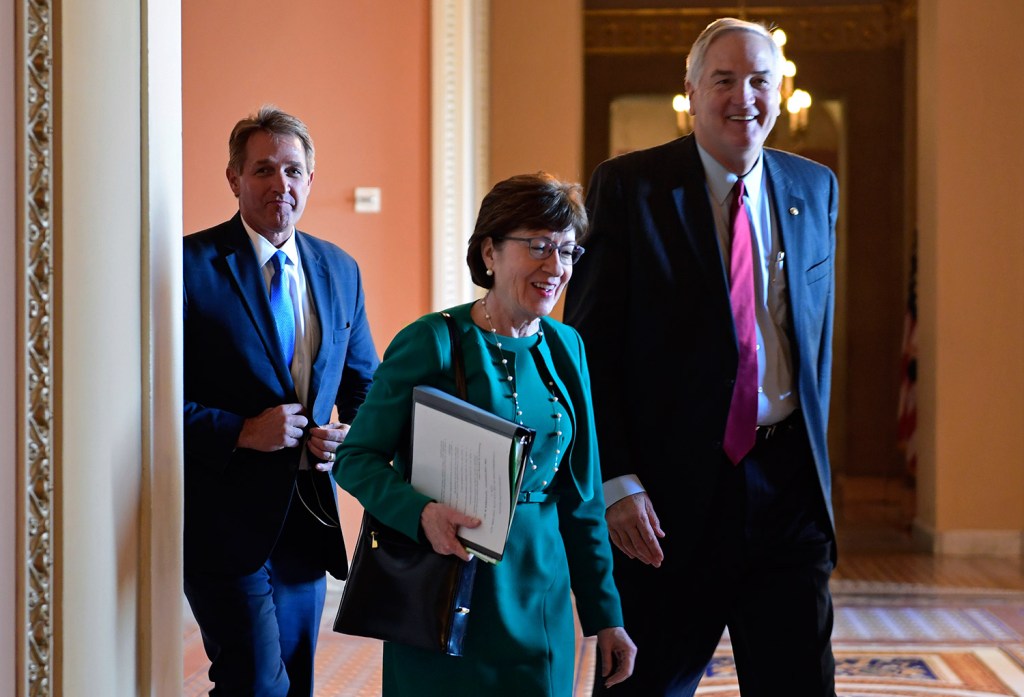
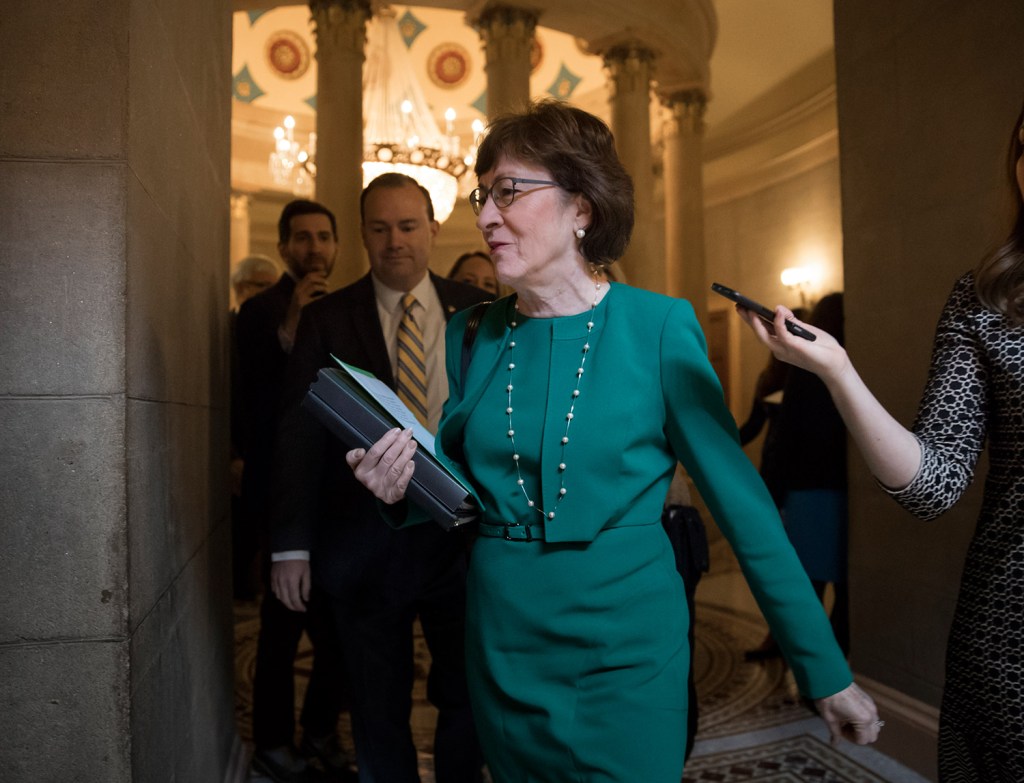


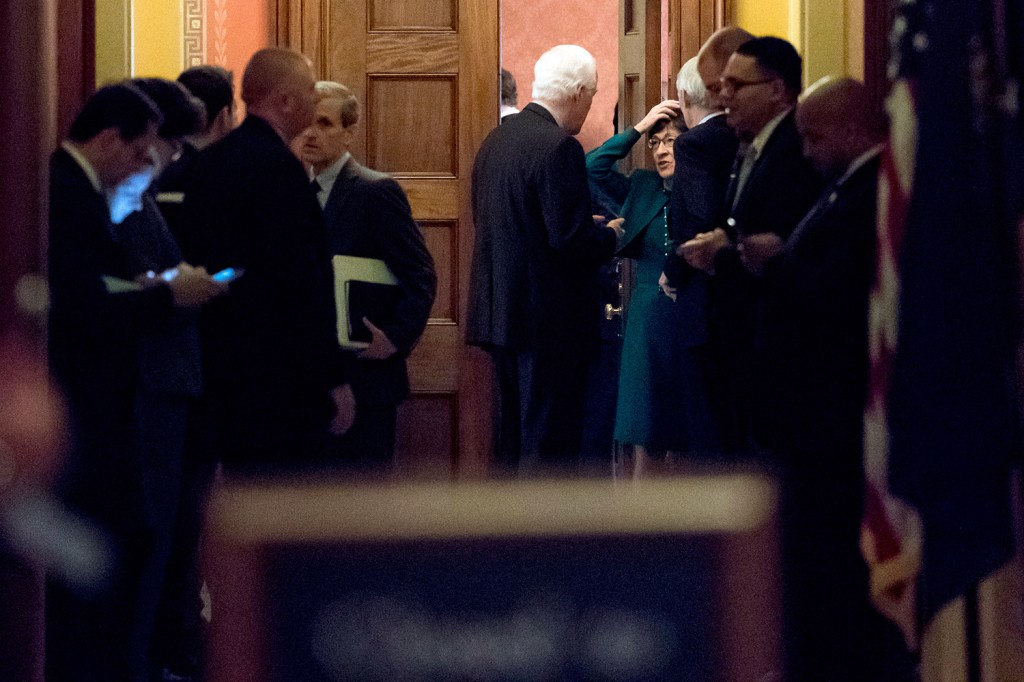
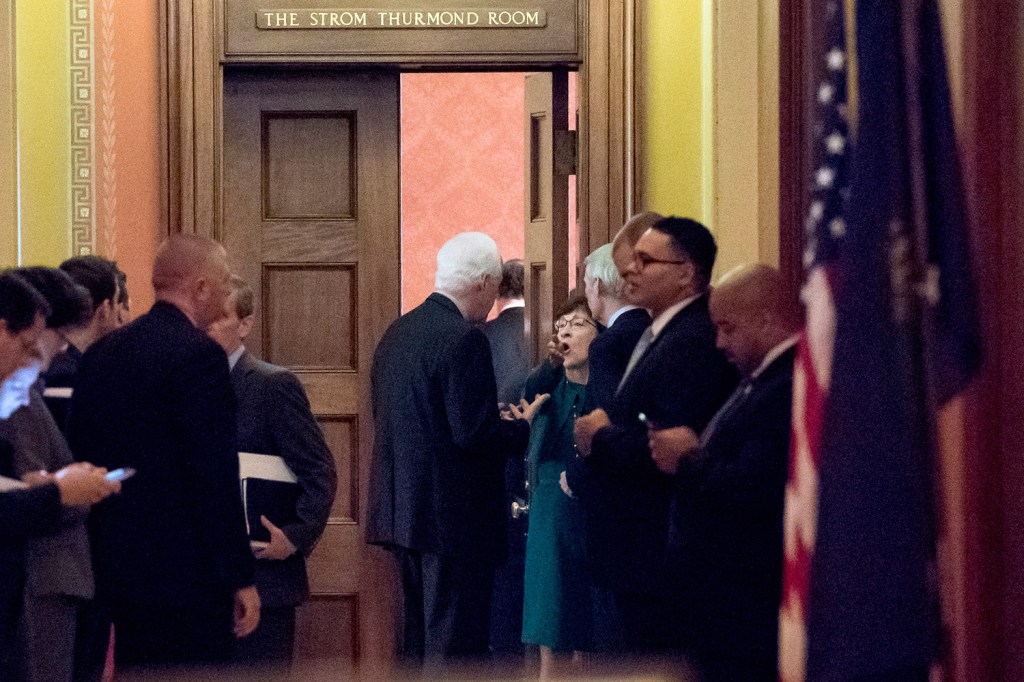
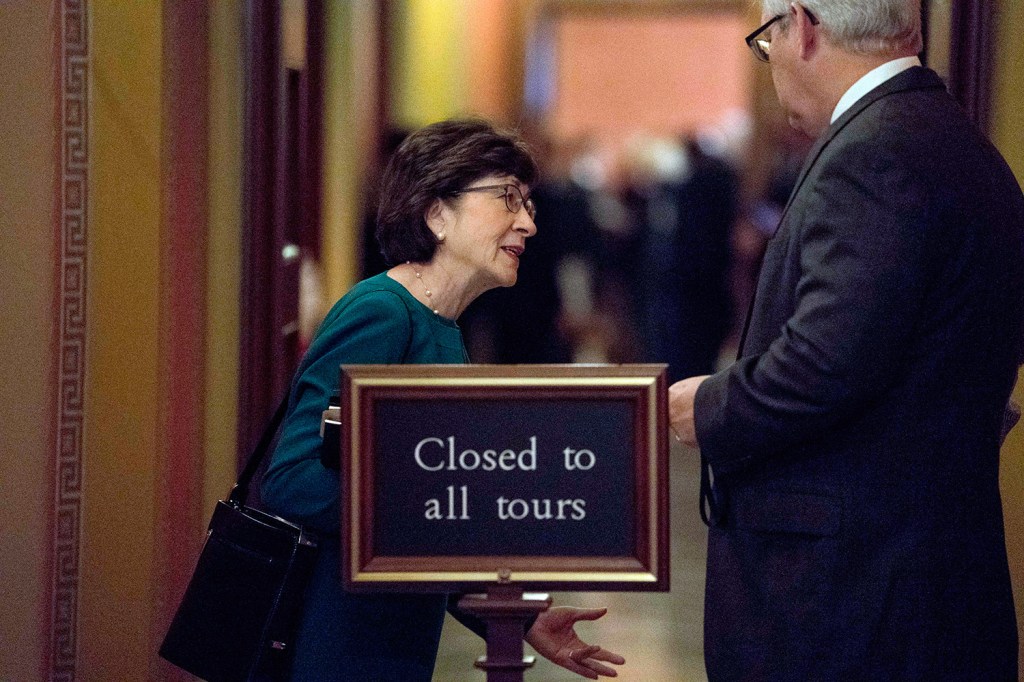
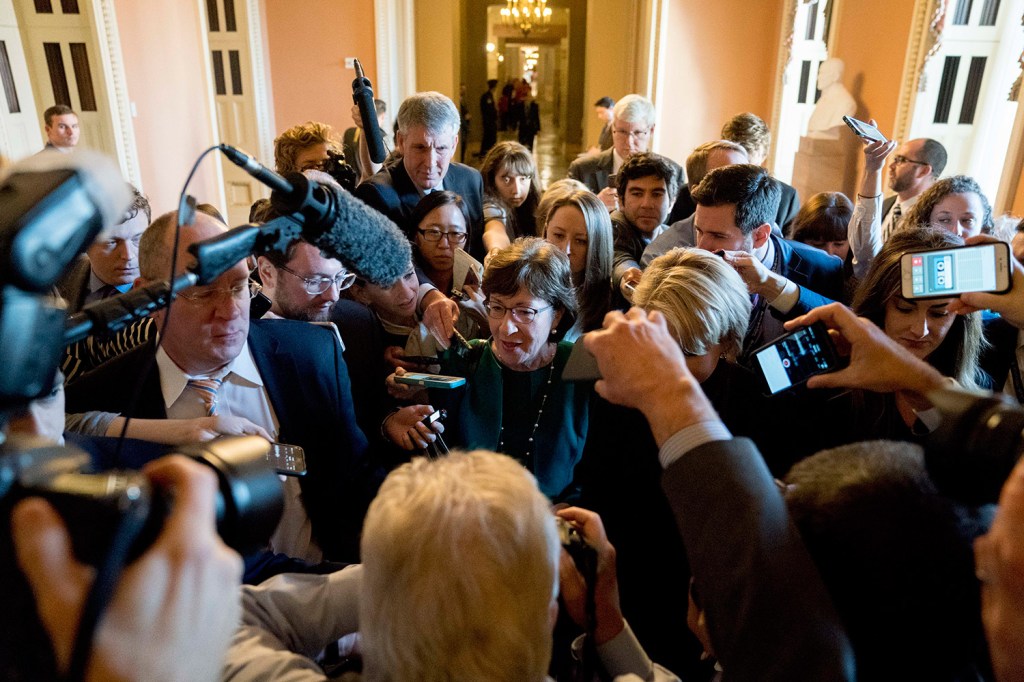
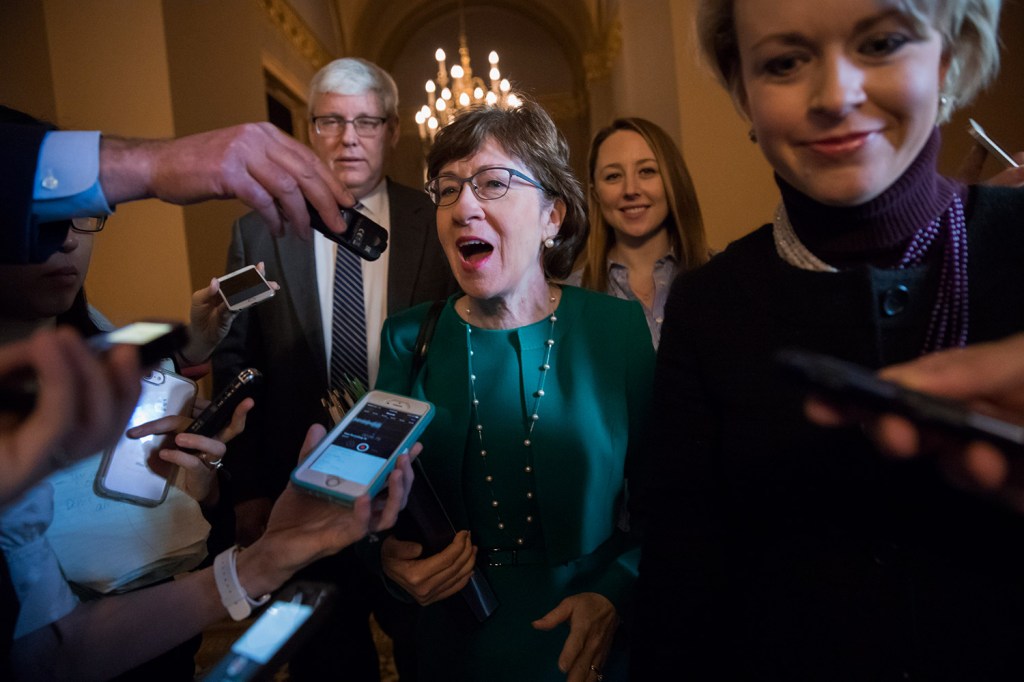

Comments are no longer available on this story